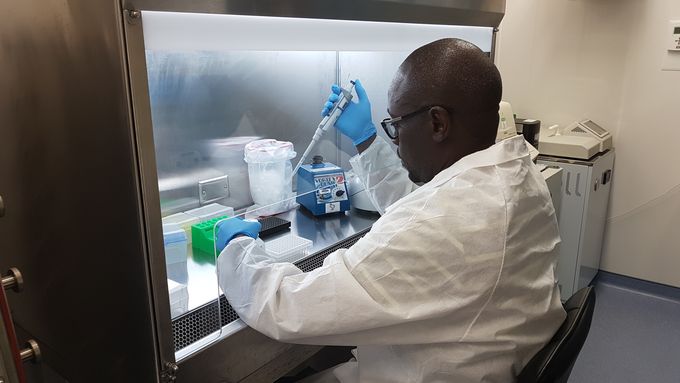Science Publication: SARS-CoV-2 Genomic Surveillance in Africa
16.09.2022
A new study in Science shows how the rapid expansion of genomic surveillance in Africa allowed the continent to describe the introduction and spread of SARS-CoV-2 variants in African countries. Swiss TPH contributed to these efforts as part of the SARS-CoV-2 surveillance programme in Equatorial Guinea.

The Science publication highlights the enormous contribution of African scientists to pandemic surveillance and response. (Photo: Elizabeth Nyakurungu)
A study published in the renowned journal Science yesterday gives insights into the evolving of the COVID-19 epidemic in Africa. Over 300 authors from Africa and abroad worked together to describe and analyse over 100,000 genomes and characterize variants in real-time. This was the largest consortium of scientists and public health institutions working together to support data-driven COVID-19 response in Africa. The results underscore the heterogeneous nature of the pandemic and highlight the need for continued diagnostics and genomic surveillance in Africa as the virus continuous to evolve.
A Network for Genomic Surveillance across Africa
The study demonstrates how the large investment, collaboration and capacity building in genomic surveillance on the African continent enabled real-time public health response. Particularly it describes the setting up of the Africa Pathogen Genomics Initiative (Africa PGI) to expand access to sequencing and cover blind spots in surveillance. The results show an increase in the number of African countries able to sequence domestically, and highlight that local sequencing enables faster turnaround time and more regular routine surveillance.
The study was led by two labs that setup the network for genomics surveillance in South Africa, The Centre for Epidemic Response and Innovation (CERI) at Stellenbosch University, Kwazulu-Natal Research Innovation and Sequencing Platform at University of Kwazulu-Natal (UKZN), in close coordination with the Africa CDC, WHO AFRO and 300 other institutions across the continent, including Swiss TPH.
From Malaria Vaccine Development to SARS-CoV-2 Screening
Swiss TPH and partners from Equatorial Guinea contributed to the study through setting up a laboratory surveillance programme. Originally, Swiss TPH set up the Baney Public Health Laboratory as part of the Equatoguinean Malaria Vaccine Initiative to work on the development of malaria vaccines. This laboratory was implemented as early as January 2020 by the Ministry of Health and became a central part of the response to the COVID-19 pandemic. A laboratory surveillance programme was setup immediately and provided real-time data on the spread of SARS-CoV-2 within the country.
As part of the surveillance programme, whole-genome sequencing of the virus was conducted to understand the introduction, spread and infection dynamics of SARS-CoV-2 variants in Equatorial Guinea. This sequencing data was made available to the public and was incorporated in the study published in Science.
“It was a great privilege to be able to contribute to this Science study together with our African partners,” said Claudia Daubenberger, Head of the Clinical Immunology Unit at Swiss TPH. “It was very satisfactory and rewarding to realize that under these highly uncertain and stressful circumstances, all partners – being it academic, private or governmental – pulled into the same direction and moved jointly and rapidly, thereby highlighting the power of partnership and collaboration."
Contact

Claudia Daubenberger
DVM, Prof. Dr.
Head of Unit
+41612848217
claudia.daubenberger@swisstph.ch
Stay connected
Subscribe to our newsletter and get all the latest research news, project updates, course and event listings from Swiss TPH.